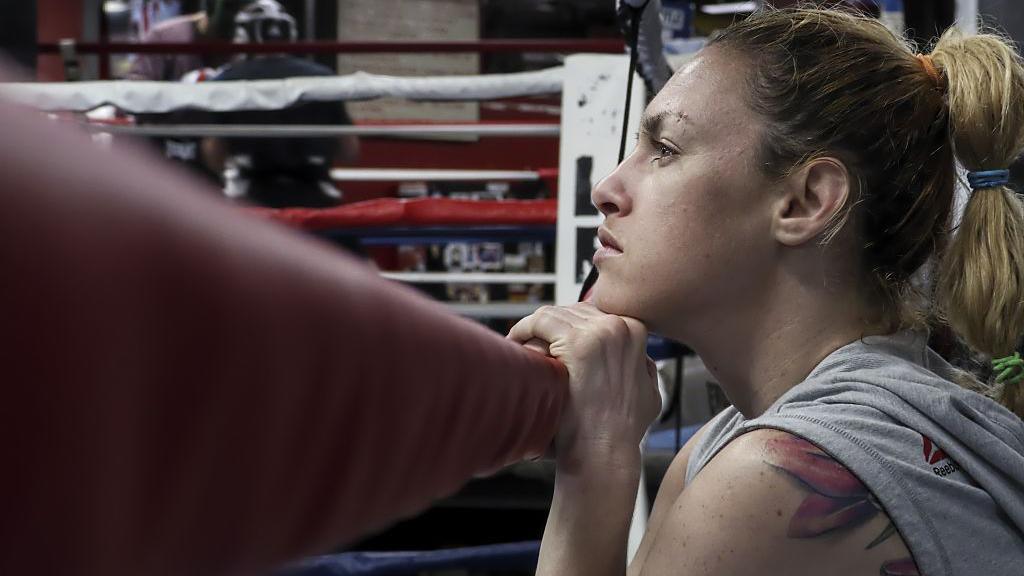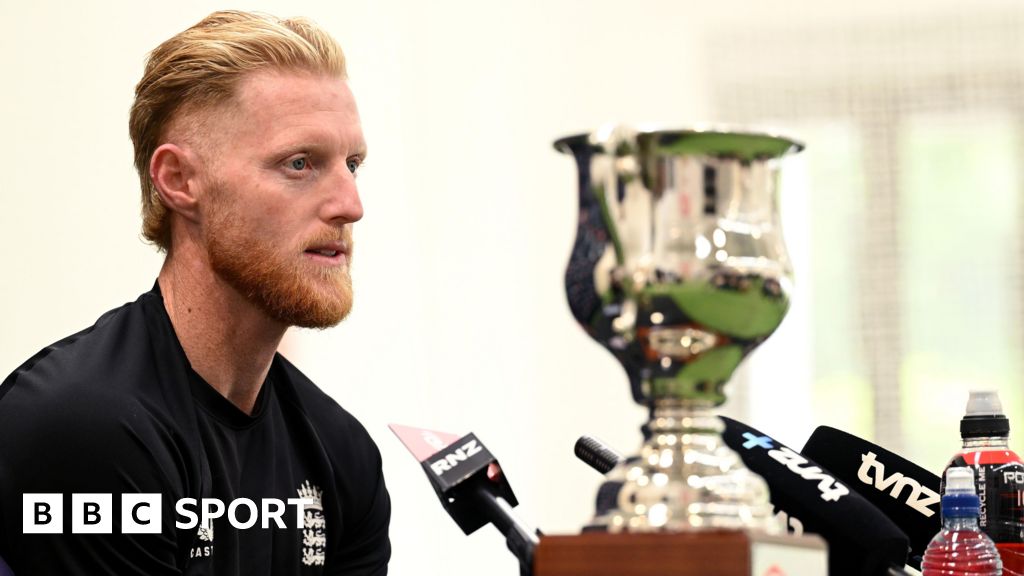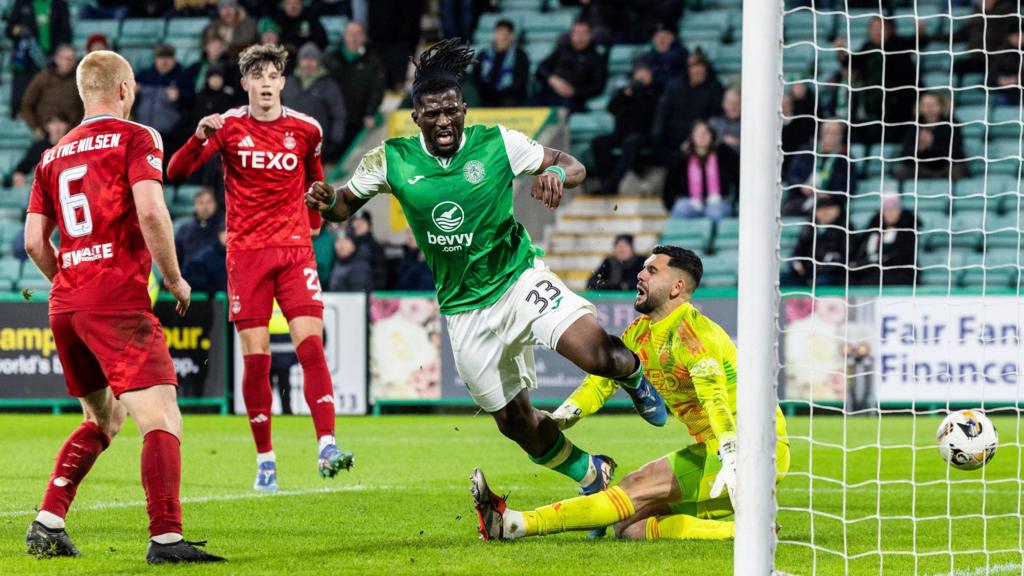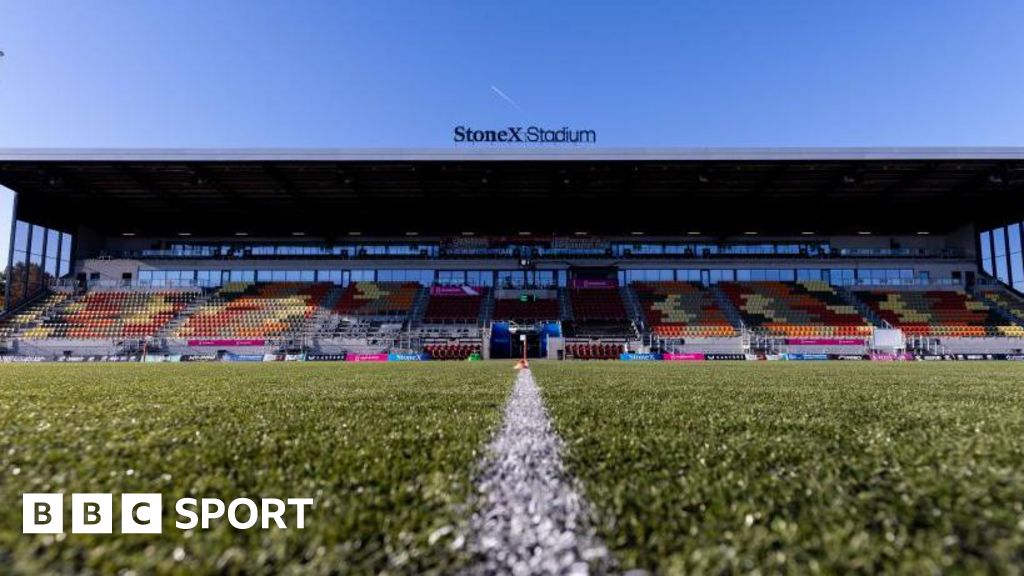ARTICLE AD BOX
 Image source, Getty Images
Image source, Getty Images
Bobbie Jackson
BBC Sport Journalist
With her left eye swollen shut and blood pouring from her forehead, Heather Hardy tells the ringside doctor that she wants to continue.
She strides back to the centre of the ring, beats her chest and shouts "I don't care, I don't care."
A near 20,000-strong crowd at American Airlines Center in Texas rises to its feet and lets out a huge roar of appreciation in admiration for a true warrior.
It is gladiatorial – it is all Hardy knows.
Hardy, 42, has never been a quitter and is not going to change the habit of a lifetime in the final minutes of her bout against undisputed featherweight champion Amanda Serrano.
They meet in the middle, touch gloves and the frantic action resumes – throwing heavy shots for the last 15 seconds of the penultimate round – before Hardy returns to her corner and once again hits her chest while soaking up the atmosphere.
One final round of all-out action follows until the bell rings and the two fighters share an embrace.
The blood is still being wiped from Hardy’s face as ring announcer Jimmy Lennon Jr prepares to confirm the result.
Serrano wins by a sweeping unanimous decision. There is no shock, surprise or protest from Hardy.
Serrano landed almost twice as many blows, and it goes down as another trademark gutsy performance from Brooklyn-born Hardy.
Image source, Getty Images
Image caption,Heather Hardy and Amanda Serrano spent 20 rounds in the ring over two fights
That contest on 5 August 2023 would ultimately prove to be Hardy's final trip to the ring in a competitive capacity.
"I came out of the ring, got home and I had double vision," Hardy tells BBC Sport.
"I also had regular concussion stuff, normal fighter stuff but the next day the double vision didn't go away and I was kind of walking into stuff and I didn't feel right.
"Long story short, it didn't get any better, but I just got used to it. It's like anything else if you break something or bruise something you just train through it."
A year on from that defeat, rather than enjoying the fruits of a long career, Hardy is instead grappling with her utility company, Con Edison, on the phone.
"My lights are getting ready to get shut off. I bet you [two-time welterweight champion] Shawn Porter doesn't have that problem," Hardy says.
Hardy and Porter are both former world champions and appeared on the same card in 2016 at Barclays Center in Brooklyn but that is where the comparisons end.
Financially they are worlds apart.
"I had this beautiful career but it's like they just pushed me back outside the fence and said 'just be happy you had the chance Heather, it was nice but go figure it out yourself', " Hardy says.
'Every time you get a concussion a piece of your brain dies'
Image source, Getty Images
Image caption,Heather Hardy trained through symptoms of chronic traumatic encephalopathy (CTE) to prepare for a Bare Knuckle Fighting Championship (BKFC) bout
On 6 May 2024 Hardy posted a statement on Instagram confirming that her Bare Knuckle Fighting Championship (BKFC) debut against flyweight champion Christine Ferea, which was scheduled to take place five days later, was off.
Former WBO featherweight champion Hardy has never been one to bite her tongue but there was a reluctance, a refusal, an unwillingness to say the word retirement.
Instead, Hardy signed off the post: "So I said the thing, ya know what that means."
And it is clear what she meant.
In the months that followed after losing against Serrano, Hardy had lost almost 30lb in weight, was dealing with persistent headaches and was unable to sleep - all symptoms of chronic traumatic encephalopathy (CTE).
CTE is a brain condition linked to repeated blows to the head and concussion. The condition, which gradually gets worse over time and leads to dementia, can only be diagnosed post-mortem.
"What I learned after was that every time you get a concussion a piece of your brain dies and you never get it back, your brain just goes on living without it because it doesn't know what it lost," Hardy says.
"Over the years I've lost so much of my brain that I can't afford to lose anything else."
The external scars have long since healed but internally they linger and may never disappear.
Just a few months on from announcing her retirement, Hardy is still coming to terms with having the rug snatched from underneath her.
"That was days of crying, trying to understand, because everything I ever did was to the max and now I have to quit when it gets hard to save my life, " Hardy says.
"Wow, not fair. Give that to someone else."
'I have to start over again'
Image source, Getty Images
Image caption,Heather Hardy's journey into combat sports began when she was bought a gift certificate for a karate dojo
Hardy cuts a dejected figure as she speaks.
Sitting at her kitchen table in her one-bedroom apartment with boxing equipment piled up in the background and wearing heart-shaped glasses, Hardy attempts to make light of her situation.
"I can't complain, I'm hanging in there and on the right side of the dirt," she says.
Boxing became Hardy's identity and Gleason's gym in Brooklyn became her home. She has poured her heart and soul into the sport, but what has she received in return? What does she have to show for more than a decade of blood, sweat and tears?
"The last two months for me has been bouncing back and learning to live like this," Hardy says.
She can no longer hit the gym on a daily basis, as she has done for the best part of two decades, and has been warned by medical professionals that any further physical stress on her body could have serious consequences.
The lightest of workouts now makes Hardy feel nauseous – she recalls passing out when her heart rate went up after trying to jump rope.
Headaches are regular, her eyesight is still yet to return to normal, she struggles to sleep and rarely has an appetite.
Hardy would often coach at Gleason’s gym to earn some extra money, but her declining health has even taken that option off the table.
"I said 'stupid, you're not in a wheelchair'. It's a hybrid feeling of high-five you made it out but I still gave everything and I have nothing, " Hardy says.
"What is hard for me to grip is that I gave so much and now I have to start over again."
Image source, Getty Images
Image caption,Heather Hardy beat Shelly Vincent for a second time in 2018 to become the WBO featherweight champion
Hardy's route into boxing was far removed from the traditional path.
She had already graduated from John Jay College of Criminal Justice in New York with a degree in forensic psychology and idolised the late Supreme Court justice and women's rights pioneer Ruth Bader Ginsburg before she even conceived the idea of a career in boxing.
Hardy knew she was a "powerful woman" but was unsure how to put her powers to best use.
Trying to make ends meat as a single mum and working anywhere between two to six jobs at one time, Hardy first stepped into a boxing gym in 2010 as a way to get a break from the daily grind. It soon became a passion and potentially a way out as she strived to provide a better quality of life for her daughter.
In April 2011, Hardy, aged 29, competed in her first amateur contest and became the US national featherweight champion just two months later.
After making her professional debut in the summer of 2012, Hardy embarked on a six-year unbeaten run, spanning 23 contests and culminating in a victory against Shelly Vincent for the WBO featherweight title at the Theater, inside Madison Square Garden.
She also challenged herself in the world of mixed martial arts and competed four times under the banner of promotion Bellator - winning two and losing two.
A first defeat in the boxing ring came at the hands of Serrano, a seven-division world champion, when they first met in 2019 and she retired with an overall record of 24 wins, three losses and one no-contest.
Hardy achieved that success inside the ring despite facing challenges few could ever imagine or would wish to experience in her personal life.
"There was everything from hurricanes to homelessness and house fires," she says.
"We were on the street with my parents living in a church basement, anything that could happen did happen.
"But I'm sitting here because I have faith in God and I've walked with him this entire path. It's a simple idea that you walk right, you do right and you don't look back. You don't give up, you don't stop and what you deserve will come."
'Pay gap in female sports in absurd'
Image source, Getty Images
Image caption,Heather Hardy was hoping to represent the USA at the 2012 Olympics
Hardy has long been one of the loudest voices in the room when it comes to highlighting gender inequality and pay disparity in the sport.
Despite her profile, Hardy still had to sell her own tickets to ensure she came out of fights with some financial reward.
"Women are making 80 cents to the dollar, the pay gap in female sports is absurd," Hardy says.
"This is something that women are constantly fighting for, constantly improving and look how far we've come in 10 years from when my career started and girls were not allowed to box on Showtime.
"The guys would say 'Heather I love you but I'm not putting you on, you're crazy'. Ten years ago, you'd think it was 1974. It will change because of women like me who won't shut up."
There has undoubtedly been a change in the landscape with female boxers getting more prominent positions on cards and pay-per-view events, although Hardy believes there has not been an improvement in pay to back it up.
"Females are being put in prime spots on prime cards and told they aren't selling fights," Hardy says.
"They are being put in the best spot on the show and being paid a fraction of what that spot is worth.
"I went out and tried to tell people 'look, women can fight' but what I really did was say 'look guys women will work for nothing and we'll do it twice as hard'."
'I am my mother's savage daughter'
Image source, Getty Images
Image caption,Heather Hardy fought at Madison Square Garden in New York on four occasions
With a family of strong women behind her, it is no surprise that Hardy has taken it upon herself to be a leading figure in the fight for equality.
Hardy says her great grandmother, Annie, was one of the first female firefighters in the US and her grandmother was the first woman to teach gym in Brooklyn.
"We always joke that if my grandmother heard me tell people I was Irish she would slap me because my grandfather's family were from Ireland but she was from Scotland," Hardy says.
She credits her mother, also a volunteer in the fire department, for helping shape her.
"My real father tried to kill us, went to jail and my mum took me and married John Hardy who is my daddy," she says.
"A very strong woman came from the ashes so I learned. It's in my blood. We don't look back, we will walk through fire. I am my mother's savage daughter."
Image source, Getty Images
Image caption,For the past decade Heather Hardy has been part the 'Give a Kid a Dream' charity at Gleason's gym
With one door closed, Hardy is already looking to force open the next one, getting her manager’s licence.
As Hardy begins to reflect on what has been a trailblazing career in combat sports, her eyes light up when asked to pick a highlight.
"I'm from New York City and Billy Joel is you know," she says. "I'm a poor Irish girl and we sang so many Billy Joel songs. We all go and see him every year when he plays at the Garden, honestly for 20 years or so.
"When I made my MMA debut and I knocked out the girl [Alice Yauger] I had fallen on my knees at one point and I was listening to everyone shout 'Hardy, Hardy, Hardy' and I looked up and thought 'Billy Joel sits here and they are singing my name'.
"I never let go of that."

 1 month ago
10
1 month ago
10








 English (US)
English (US)